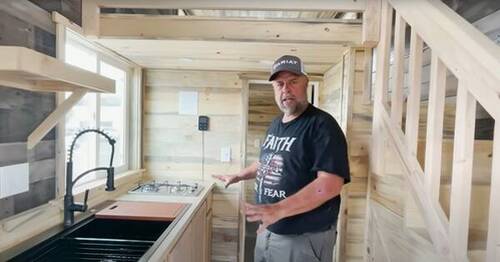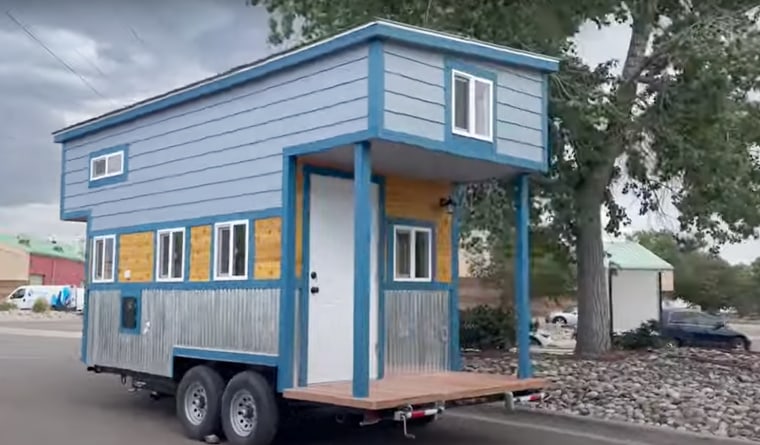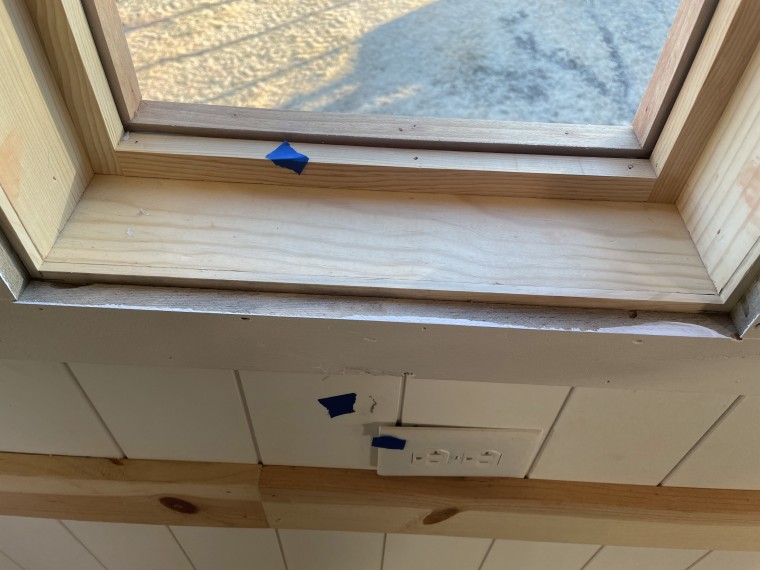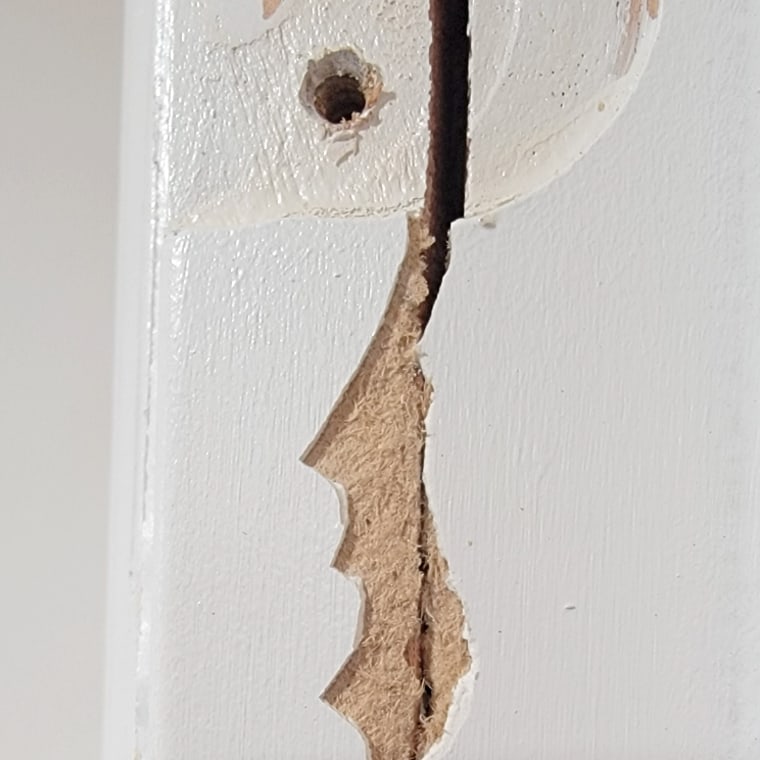
They put their faith in a God-fearing man selling them tiny homes. Now they’re suing him for fraud.
DENVER — A man who had been convicted of bilking investors out of thousands of dollars and who professed his love for God while selling tiny homes online swindled homebuyers out of their life savings for dwellings that were never delivered, three alleged victims said in lawsuits filed in federal and state courts.
Developer Matt Sowash, founder of the Colorado-based nonprofit Holy Ground Tiny Homes, promoted the small residences on social media, including to his 80,000 TikTok followers, with short videos portraying an upbeat, God-fearing man selling the American Dream — affordable homes with financing and no credit checks.
“For people that can’t pay for a house all at once, we can finance you. Holy Ground Tiny Homes. Get yours today,” Sowash said in one TikTok video.
“Great house, available now, around $45,000 is what this goes for. Come in and take it away,” he said in another video, wearing a T-shirt adorned with “Faith Over Fear.”
Sowash said in an interview that he never set out to take advantage of homebuyers, but he’s not sure he’ll be able to build the 250 homes already paid for, in full or in part.
He acknowledged that because of supply chain problems and the rising costs of construction materials, his nonprofit is up to three years behind schedule.
“A smart businessman would have filed for bankruptcy, and then he’s off the hook and can start fresh again,” Sowash said. “Then all those people lose. I’m obviously not a smart business guy, because I can’t sit back and watch all those people lose homes.”
A plaintiff in one of three lawsuits filed against Sowash said in an interview that the builder’s persuasiveness and Jesus-loving persona convinced her to part with her hard-earned cash.

“That’s part of what sold me. He’s charming, convincing and I believe in God,” said Clara Virginia Davis, 24, an elementary schoolteacher in upstate New York.
Davis wired $42,000 to Sowash in January for an 8-by-28-foot modular home with an open floor plan, front porch and wood-burning stove. It was supposed to be delivered by Aug. 1, in time for the first day of school, but it never arrived.
“I gave him my life savings,” Davis said.
Davis filed a lawsuit against Holy Ground in August in U.S. District Court in Colorado, seeking a refund and other damages.
She said she is living in a camper without insulation and unless her house arrives before winter, she’ll be forced to quit her new job and move in with one of her parents in New Jersey.
“I’m just extremely desperate,” Davis said.
Sowash said he tried to call Davis about her home but never heard back until her lawyer reached out a couple of weeks later wanting to negotiate a settlement. Sowash said the home was not scheduled to be completed until next month but construction was supposed to have started three weeks ago.
In another lawsuit filed in June in Arapahoe County District Court in Colorado, Robyn and Mark Bellamy, who live in Oregon, said they paid Holy Ground nearly $70,000 last year for two modular homes they never received.
The Bellamys and their lawyer could not be reached for comment, but the lawsuit lays out their case:
Robyn Bellamy paid $47,924 in February 2021 for a home that was scheduled for delivery five months later. When the deadline approached, Holy Ground informed her that delivery would be delayed. Then it was delayed again and again and again.
She was last informed her home would be delivered in May, but she still has not received it. She demanded a refund, but Holy Ground said it could give her the money back only if it was able to sell the unbuilt structure to someone else, according to the suit.
Mark Bellamy said he agreed to pay Holy Ground $32,477 in installments over 12 months for a tiny home of his own two months after his wife bought hers. But as uncertainty about the company became apparent because of his wife's experiences, he stopped making payments after having already dropped $21,600. He demanded a refund but was never given one.
"We’re still in the process with that suit,” Sowash said. "They were on our build list. I had called them up to start working on their (floor) plans and they said to stay in contact with their lawyer.”
Sowash has faced plenty of legal problems in the past. He was sentenced in 2009 to five years in prison for bilking more than $470,000 from investors who gambled on an amateur poker league he had founded and for stealing $140,000 from three other investors who thought he was looking for investment opportunities for them.
He ended up serving about two years of his sentence.
Sowash was also the target of a 2007 murder plot devised by a dissatisfied league investor and a private investigator the investor had hired, according to law enforcement officials in Colorado.
The men planned to kidnap Sowash, force his legs into a box with poisonous rattlesnakes until they bit him and then take him to a hiking trail where he would be left to die. The plot was never carried out and each man pleaded guilty to one count of extortion.
Sowash, who is currently on parole, said he “found God” while serving his prison sentence 13 years ago.
“I was saved in a prison cell back in 2009 and from that point on, God gave me a vision to love and serve the community,” he said. “I thought building tiny homes would be a great way to provide finances for that.”
A self-proclaimed lifelong handyman, Sowash said he built his first tiny home out of his garage in 2019, selling it for $12,000. From there, requests for homes began rolling in, he said.
The structures are all 8-feet wide but can be as long as 14 feet, with the average cost being about $29,000, he said.
His latest legal trouble came on Sept. 2 when lender Kinetic Direct Funding filed a lawsuit against him and his nonprofit, Revelations in Christ, in state court in Brooklyn, New York.
Sowash said he took out a $400,000 loan from Kinetic to build the tiny homes, but he couldn’t keep up with payments because of a high interest rate.
“I just couldn’t do it,” he said.
Kinetic Direct Funding officials did not return phone calls seeking comment.
Sowash informed his customers in an Aug. 31 letter that home deliveries were up to three years behind schedule.
“The past several months have been very exhausting in terms of the struggles associated with making sure everyone either gets the home they ordered” or receives a refund, Sowash wrote.
Sowash said in the letter that Holy Ground has delivered more than 250 homes in the past 20 months, but nearly 100 were sold at loss of $8,000 to $10,000 each because of high material costs.
For Theresa Meggitt of Lakewood, Colorado, who paid $14,000 for a tiny home in February 2021 that she never received, Showash’s explanation doesn’t cut it.
“Nobody will do anything, and I’m frustrated,” said Meggitt, 54. “They still haven’t started on my home, and I don’t think they have intentions to.”
Meggitt said she hasn’t filed a lawsuit because she’s still holding out hope her home will be built.
“She’s definitely one of the ones on our build calendar that is coming up very shortly,” Sowash said.

Alexandra Maes, 28, of Greeley, Colorado, said she was touched by Sowash’s professed love of God and talk of using some of the proceeds to build a sober living center for people in recovery. She used her and her partner’s life savings of $25,000 to buy their dream home, she said.

It arrived in November, six months late, but there were holes in the walls throughout the house, which she marked with blue tape, and another hole that was covered up with pieces of wood, among other defects, she said. Sowash refused to make repairs, she said.
Sowash said he didn’t remember Maes but that he has always repaired homes if there is structural damage upon delivery.
“There’s never been a customer that we have refused to go out and take care of,” Sowash said. “I would love to be able to look into that further.”
Maes said she can’t afford to file a lawsuit or repair the house.






